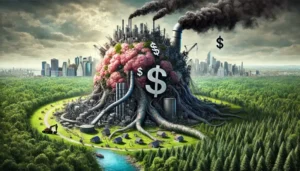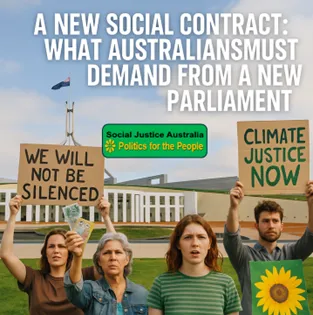Description
A new social contract. Australians deserve better. Discover how to restore justice, services, and democracy in our post-election parliament.
Introduction – Reclaiming the Social Contract
Location: Suburban Melbourne, 1983.
You walk into a bulk-billed GP clinic with your Medicare card. After catching a public bus, you head to your TAFE class, which is affordable and well-integrated. Your dad’s job at the post office lets your family own a modest home. That was the Australian dream.
Fast-forward to today.
Your child pays $30 to $100 for a GP visit if the doctor doesn’t bulk bill. Your local TAFE has been merged, gutted, or closed. Your job is casual, your rent has doubled, and your HECS debt is growing.
What changed? The social contract broke.
This article reimagines a fairer future in which government serves the people, not corporations, and Australia’s currency sovereignty funds the public good, not private greed.
With Labor returned to power in the 2025 federal election, now is the moment to demand they honour their progressive roots and deliver meaningful reform. The mandate exists. The excuses must end.
The Broken Promises of the Old Order

Since the 1980s, neoliberalism has reshaped Australia’s political and economic identity:
* Public assets like Telstra, Qantas, and electricity were sold off.
* Medicare and public housing were hollowed out.
* Secure full-time work declined; casualisation soared.
Real story: Emily, a 27-year-old disability support worker, works two part-time jobs without benefits. She reflects, “I’m exhausted. And yet, I’m still broke.”
Neoliberalism promised efficiency. What it delivered was uncertainty.
Two-Party Capture and Political Disillusionment
Labor’s election victory provides an opportunity to reverse decades of bipartisan failures. But trust must be earned:
* Corporate tax cuts continued under both major parties.
* Donor influence continues to shape policies (e.g. fossil fuel lobbying).
* Media monopolies still manipulate public perception.
Australians did not vote for more of the same — they voted for leadership that reflects public will.
Core Principles of a Renewed Social Contract
1. Economic Justice Through Currency Sovereignty
Australia issues its own sovereign currency. This gives our federal government unparalleled spending power:
Using this power:
* Fund full employment via a Job Guarantee
* Erase HECS debt
* Rebuild public services without raising taxes

Real-world example: China has used its currency sovereignty to build entire cities, transport systems, and innovation hubs that serve its people.
2. Public Services as a Right, Not a Commodity
Essential services should not rely on profit:
* Universal healthcare must expand, not shrink
* Free public education from preschool to TAFE and uni
* Public housing built directly by government
Labor now has the platform and authority to restore what was lost. Will they?
3. Democratic Accountability and Transparency
Australians demand a voice in governance:
* Real-time political donation disclosure
* Truth in political advertising
* Participatory budgeting at local and national levels
A quote from an activist in Warringah: “We’re tired of being ruled by donors. We want citizen power.”
4. Environmental Justice and Sovereign Climate Action
The new contract must secure our environmental future:
* Nationalise energy grids to speed up the green transition
* End fossil fuel subsidies
* Invest in Indigenous-led land management
Labor claims to lead on climate. Now they must deliver — not in slogans, but in structural change.
What Australians Must Demand from Every MP
A Voter’s Non-Negotiable Charter
* Support a federal Job Guarantee
* Reject privatisation of public assets
* Pledge to rebuild public housing
* Commit to peace, not militarism
Labor MPs must lead the charge or step aside for those who will. This is the people’s contract.
Stories That Inspire Action
Historical Lessons from Australian Policy
* 1945-1975: The Government built tens of thousands of public homes each year
* 1984: Medicare was established despite business opposition
* 1970s-80s: TAFE and apprenticeships flourished; the government trained many tradespeople before joining private industry.
Modern Movements Changing the Landscape
* Teals are fighting for integrity and climate
* First Nations campaigns for truth and treaty
* Community banks returning power to local economies
From Passive Electors to Empowered Citizens
Your Role in Writing the New Contract
Reflect on how you voted and why. Next time, don’t rely on how-to-vote cards; make informed, values-based choices.
Stay engaged: monitor how your MP performs and support independents or minor parties in future elections where Labor fails to act.
Demand local forums and post-election accountability from all representatives; your voice matters beyond election day.
Thoughts from a reader: “When I started attending council meetings, I realised just how much could be influenced locally.”
Conclusion – Australia’s Future is Public
With Labor in government, the window is open, but only just. They must be pushed to remember who they represent: not donors or lobbyists but the people.
Australia’s future being public means placing the common good at the centre of every policy decision. It means reinvesting in the public institutions that once ensured opportunity for all, from public housing and education to Medicare and national infrastructure. It requires viewing healthcare, education, transport, housing, and clean energy not as commodities to be sold to the highest bidder, but as rights guaranteed to every citizen by a democratically accountable government.
Furthermore, it also means embracing the immense power of our currency sovereignty to fund public purposes, instead of allowing myths about budget constraints to justify inequality and neglect. When the government spends on corporate subsidies or military expansion, that is a political choice, not an economic necessity. A public future reclaims spending for what matters most: the well-being of people and the planet.
We are at a crossroads. Australians can continue to accept a future of insecurity and inequality. Or we can rise together to forge a new social contract grounded in justice, equity, and public purpose — a future in which the public interest finally comes first.
Governments must serve us. And we must demand it.
Q&A Section
Q1: What is a new social contract, and why does it matter today?
A: It’s a mutual agreement between citizens and the government on rights, responsibilities, and public services. It shapes how a society functions.
Q2: How can we afford all these changes?
A: Australia issues its own sovereign currency. The constraint is real resources, not tax revenue. We can fund public services without borrowing from the private sector.
Q3: What can everyday Australians do to help change this system?
A: Vote strategically, join local groups, write letters to MPs, share independent media, and demand transparency from elected officials.
Question for Readers
What changes do you want included in Australia’s new social contract? Share your vision in the comments below.
Call to Action
If you found this article insightful, explore more about political reform and Australia’s monetary sovereignty on Social Justice Australia:
👉 https://socialjusticeaustralia.com.au/
Share this article with your community to help drive the conversation toward a more just and equal society.
💬 Click on our “Reader Feedback” menu: Please let us know how our content has inspired you. Submit your testimonial and help shape the conversation today!
Support Social Justice Australia – Help Keep This Platform Running
Social Justice Australia is committed to delivering independent, in-depth analysis of critical issues affecting Australians. Unlike corporate media, we rely on our readers.
If you value this content, consider a donation:
🔗 Donate Now:
Your support helps:
✅ Keep this website running ad-free
✅ Fund truthful research and reporting
✅ Expand awareness of urgent public issues
Even a small contribution makes a difference.

